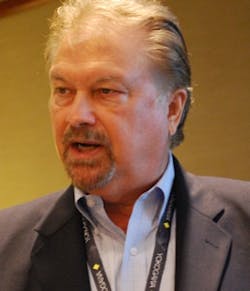Check Out Montague's Google+ profile.
Even experts need advice and support in new and unfamiliar areas, and the best ones know when to seek it out. Knowing what you don't know is half-way to knowing, right?Well, multi-talented engineering, procurement and construction (EPC) firms often have all the answers for their industrial clients. However, when they need some added or more specialized know-how, especially if it's related to Yokogawa's many technologies and solutions, they can consult with several of its engineering services organizations, which were also organized around EPC needs about two years ago.
Several representatives of these teams discussed their capabilities and answered questions during an EPC panel discussion this week at the Yokogawa Users Conference and Exhibition 2014 in Houston.
"The main goals of EPCs are meeting schedules, minimizing costs and mitigating risks on a project, and Yokogawa does the same with our VigilantPlant Solutions (VPS) for automation systems, Advanced Analytical Solutions (AAS), and Measurement and Control (M&C) program," said Ken Trimble, Yokogawa executive account manager, who moderated the panel. "In fact, our VPS group includes more than 300 engineers, designers, fabricators and other discipline personnel and has completed more than 500 projects from $500,000 to $120 million, including main automation contractor (MAC)-type services." Similarly, the AAS division has installed more than 8,000 analyzers as part of projects in more than 24 countries. It has experienced sample-system engineers, dedicated sample-system fabricators and complete factory acceptance test (FAT) facilities.
Plan Ahead, Monitor Closely
"If we tell the customer something, they can take it to the bank." Yokogawa's Ken Trimble on the depth of understanding of the company's VigilantPlant Solutions team when it comes to Yokogawa systems and products.
Because all projects have their own unique issues and problems, Trimble reported that Yokogawa's EPC teams work closely with each one to develop a detailed project-execution plan for completing its project successfully. These plans include conducting risk analyses, developing contingency plans and dealing with hard issues as they occur. "We have good knowledge of our market space and competing offerings and technologies, but we have superior knowledge around our own products and offerings," said Trimble. "If we tell the customer something, then they can take it to the bank. We'll also build panels and dedicated sample-system buildings as needed because maintaining a single source makes sense. We may not be the lowest bid, but we'll have the right bid. We're honest with our customers—sometimes brutally so—taking the philosophy that we would want to be told as soon as an issue arises, so the right mitigation plan can be developed or the proper decision can be made."VPS works out of two buildings with a total of 160,000 square feet in Newnan, Georgia, and Sugar Land, Texas. These two facilities have a combined 80,000 square feet of fabrication and staging space. More recently, the Newnan site also expanded its measurement and control (M&C) flow lab to handle more shale gas and greenfield projects. The Texas office opened at the same time as its counterpart facility in Singapore, but even though they're far apart, they still collaborate effectively, according to Ron Eddleman, Yokogawa's sales manager for Advanced Analytical Systems Integration in North America.
"We communicate very closely and attend each other's meetings and factory acceptance tests (FATs) to get projects off the ground," said Eddleman. "In fact, we just finished a large project with three system integrators for which we did 80% of the work in Singapore, but managed it from Sugar Land."
Act Proactively to Head Off Schedule Risk
Trimble added that typical risks to the costs and scheduling of most projects include incomplete specifications, late submittal of requests for quotes (RFQs), incomplete stream data, long drawing review cycles, long lead-time analyzers, exotic materials requirements, design changes after drawings are approved, unrealistic schedules and international shipping delays. "We meet these challenges with our sample-system design experts, who also offer classes in sample-system design, as well as our dedication to analytical systems integration, strong project management teams, veteran sample-system fabricators, complete FAT facilities and our gas chromatograph (GC) lab in Sugar Land," said Trimble.
"Every project is assigned a dedicated project specialist that serves as a single point of contact for all matters," added Trimble. "Project kick-off meetings are held to discuss deliverables and expectations at the beginning of each project, and they're staffed with a project documentation team that prepares all project documentation. Also, varying reporting methods are used as dictated by individual project requirements, and frequent status meetings are held to update all stakeholders on project status and resolve any open issues."
Curtis Casebier, Yokogawa's vice president for VigilantPlant Solutions in North America, added that, "All projects can be done better, and our industry is all about learning experiences. So we gain a lot from lessons learned over time about how projects can be better organized and carried out. However, we're not going to get the best data on the first day of any project, so we plan activities along the way to take advantage of the most useful data we can find. You can't realize what not to do until you have that good data. At the same time, many EPCs bring in too much instrumentation and other data that quickly becomes unusable, so we can help them and their clients prioritize upfront and focus on what they need to know to make better decisions."





